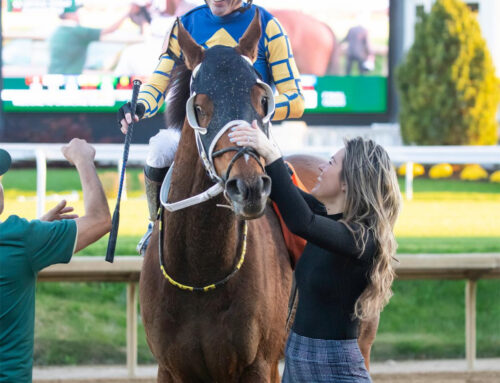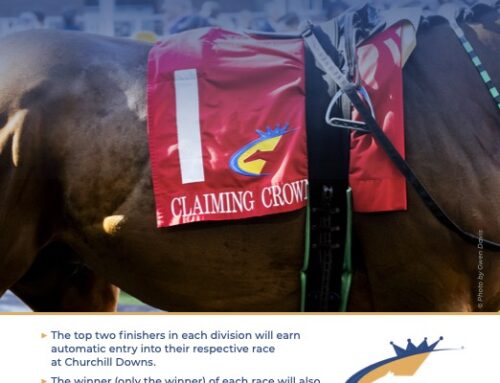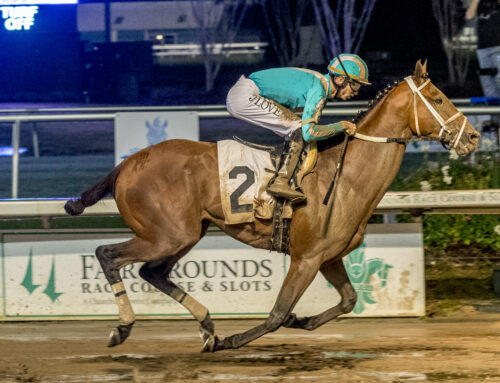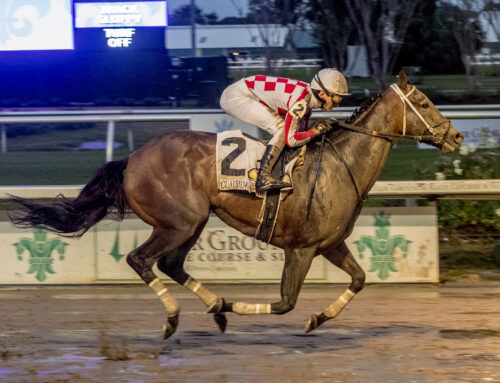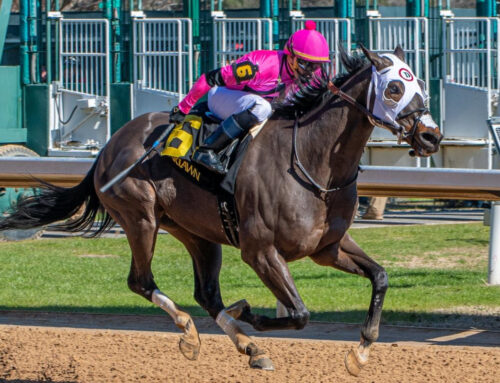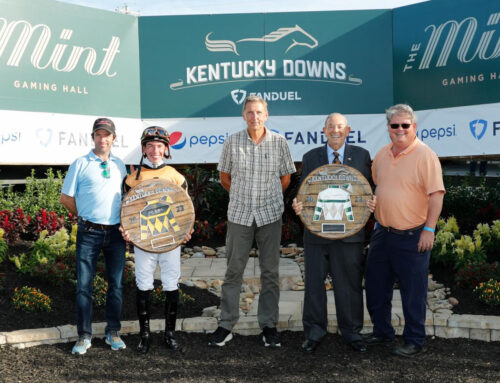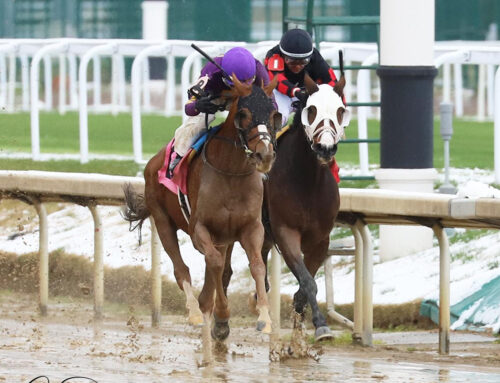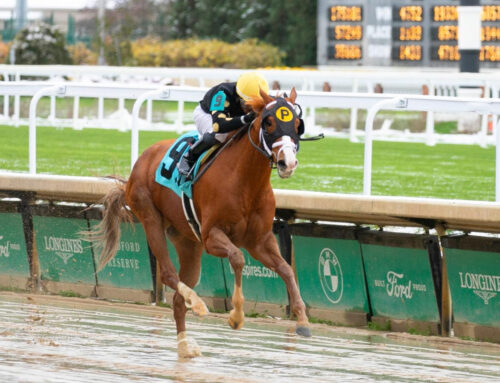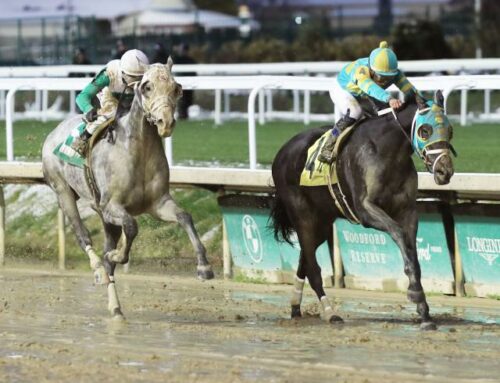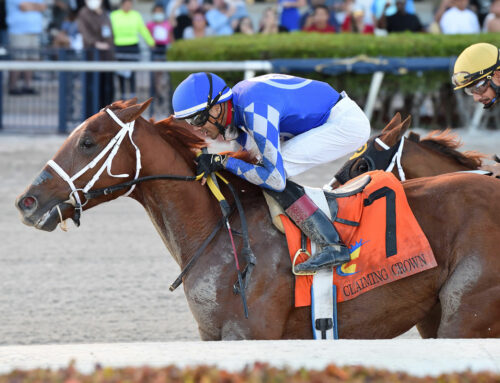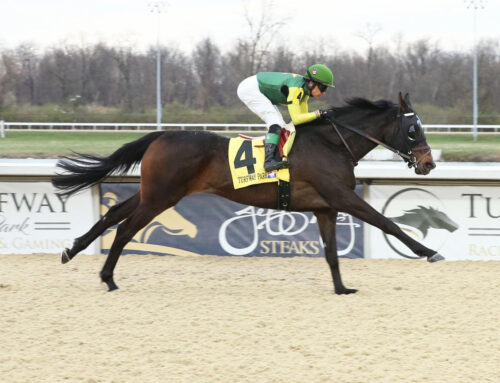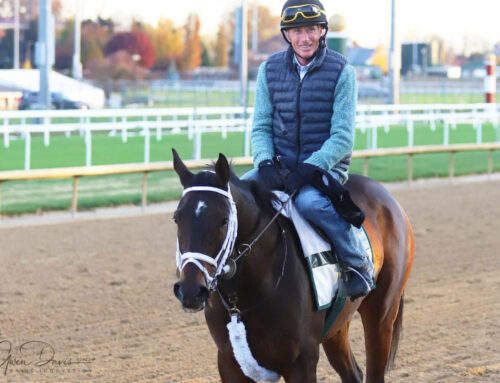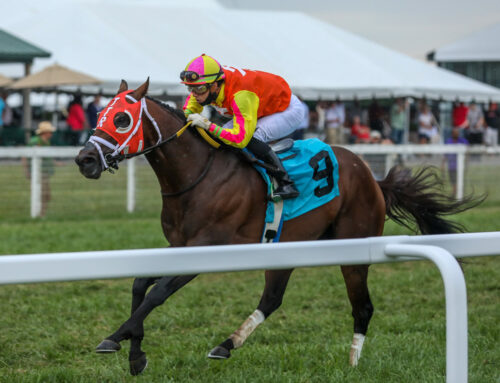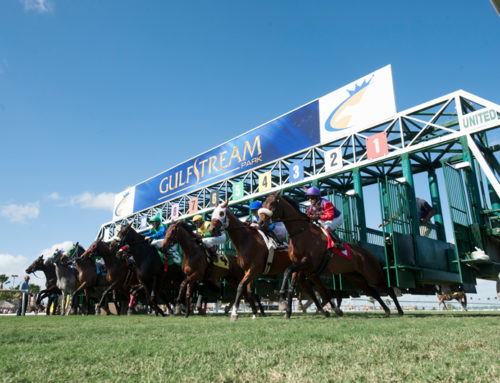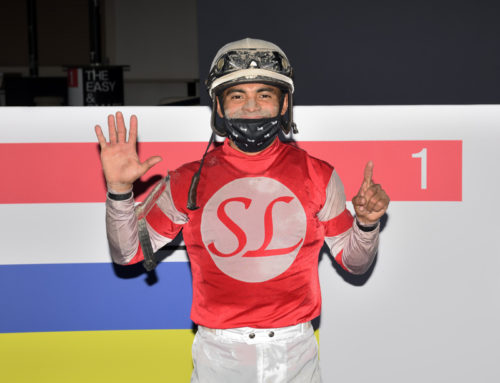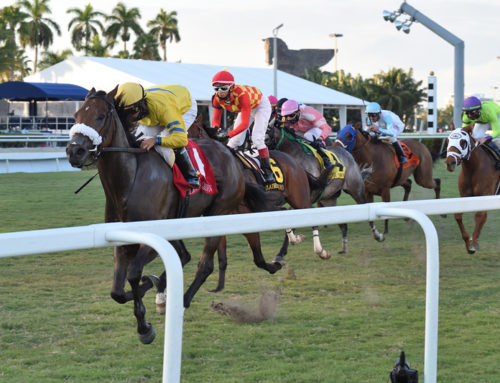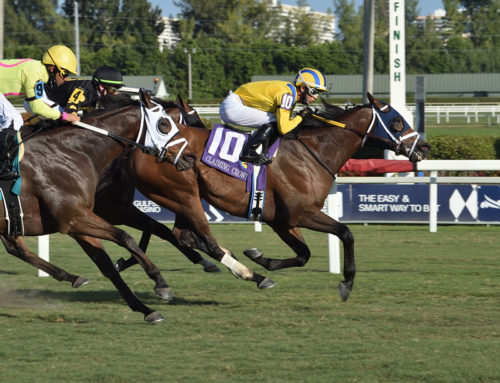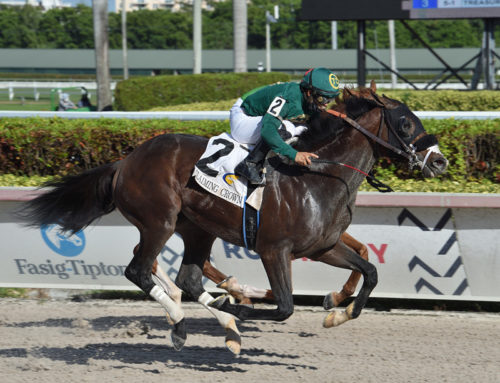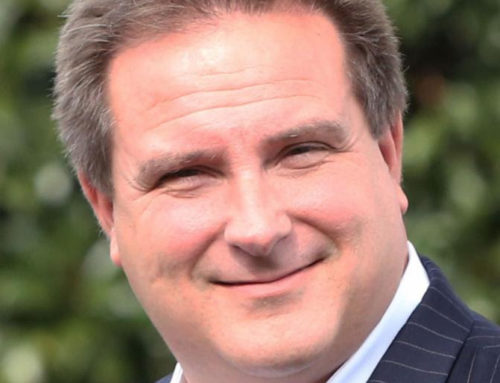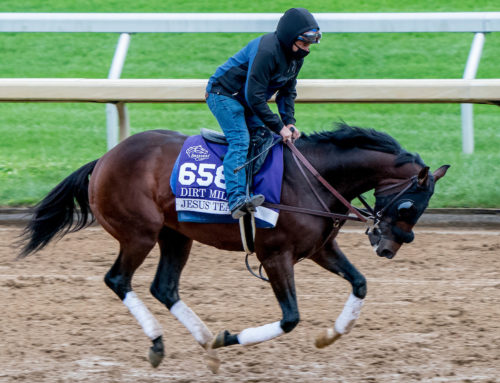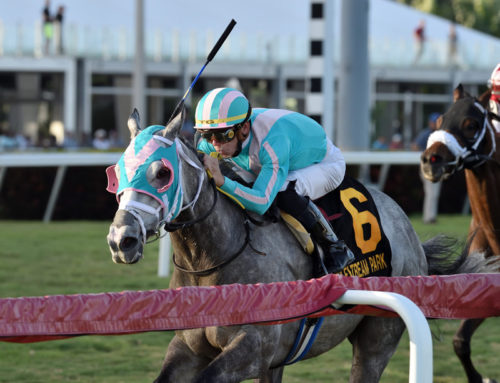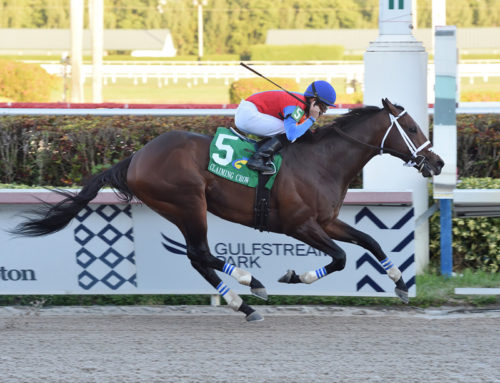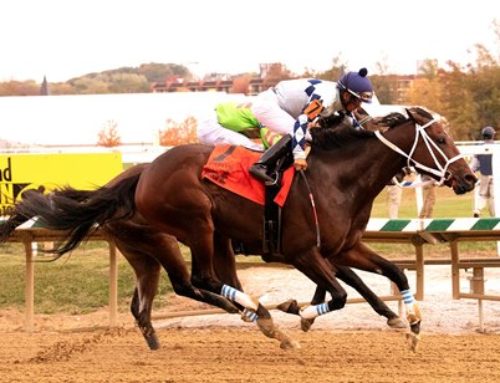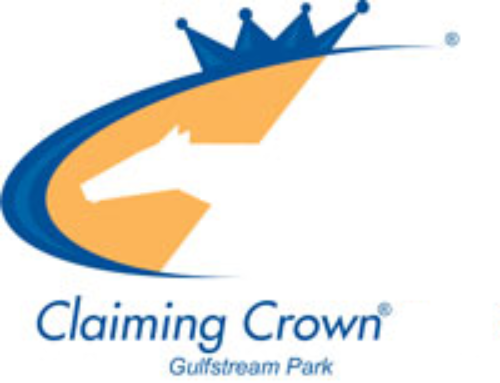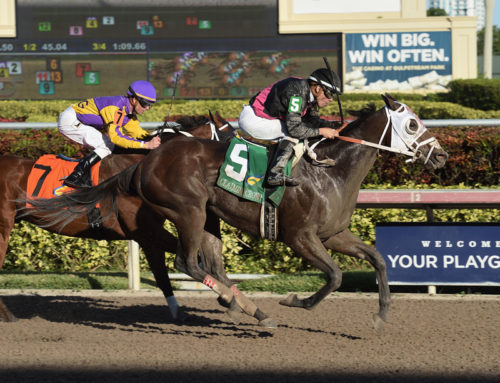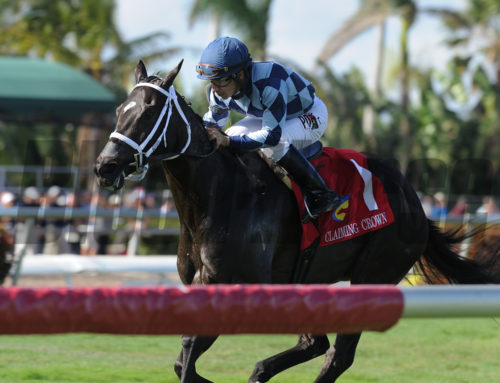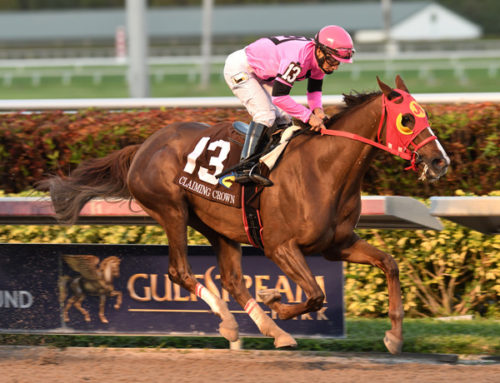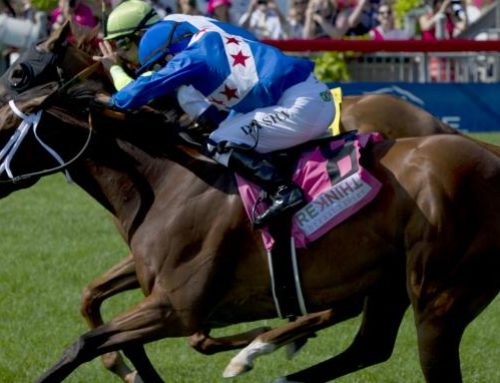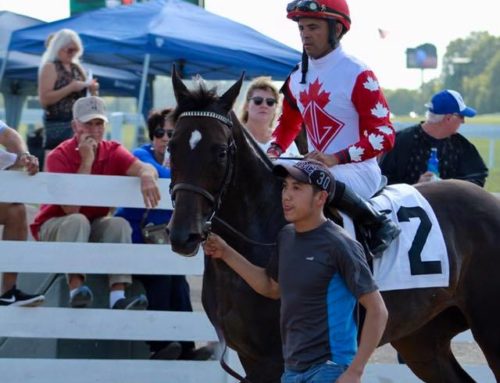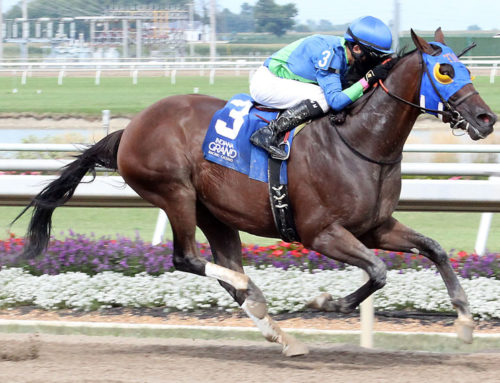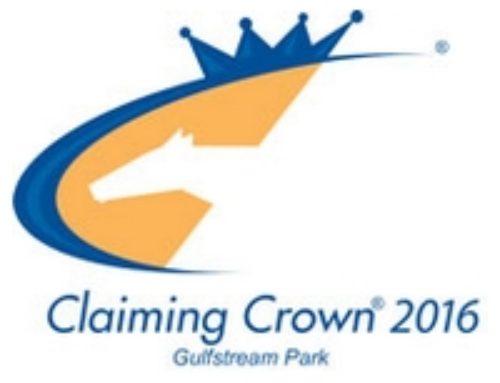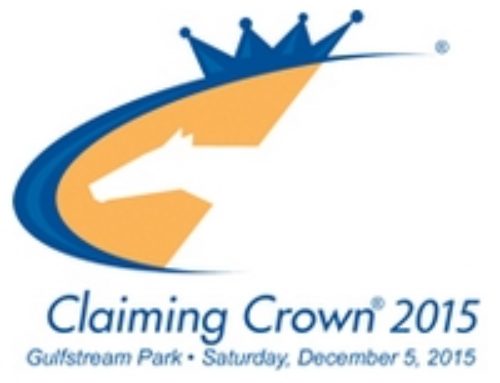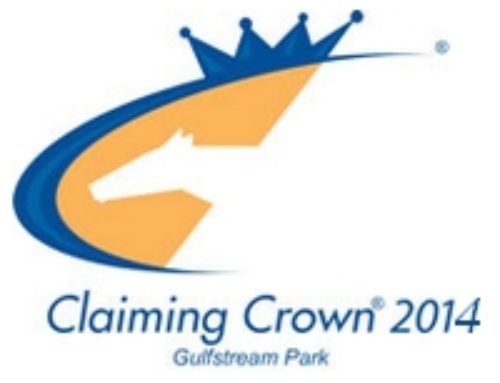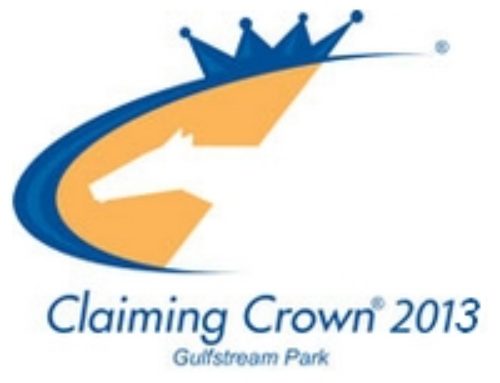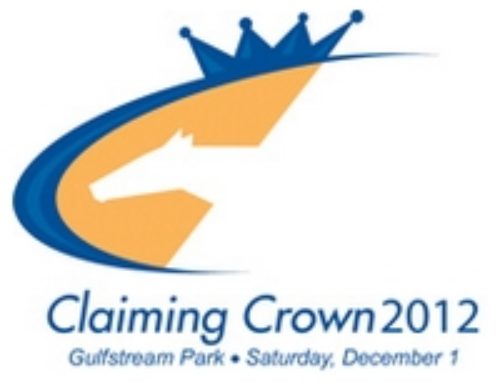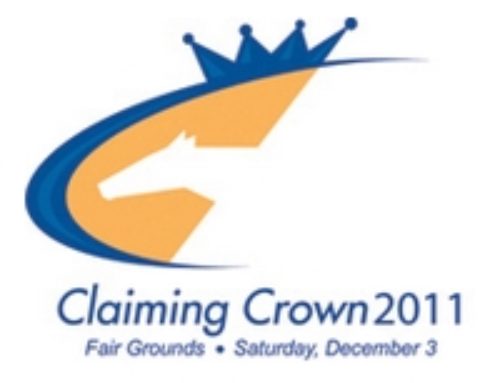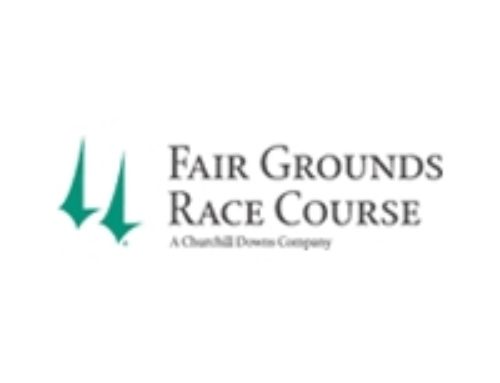
Digital training at Churchill Downs (Jennie Rees photo).
Longtime Kentucky HBPA president Rick Hiles knows how big a deal it is for racing’s rank-and-file horsemen to participate in the Claiming Crown, the series of big-money starter-allowance races for horses that are or have been claimers.
Hiles is one of those “every-day” horsemen — his words. While he once had a barn full of horses, today he trains five horses at Churchill Downs. One of them, Digital, will compete in Saturday’s Claiming Crown Jewel, the 1 1/8-mile race that carries a base purse of $175,000, with another $25,000 available for Kentucky-breds through the Kentucky Thoroughbred Development Fund (KTDF).
After a 10-year run at Florida’s Gulfstream Park, the eight-race Claiming Crown comes to Churchill Downs for the first time and to Kentucky for only the second time. It was held at Ellis Park in 2007.
“The Claiming Crown gives the every-day working horse — and trainers and owners — a chance to get recognized,” Hiles said. “Everybody can’t have a Kentucky Derby horse, you know. It’s a real honor to have one of those horses running there. These are the blue-collar working-class horses that make the industry go. They get out here and knock it out. They’re not like those elite stakes horses that run five or six times.”
The Claiming Crown was created by the National Horsemen’s Benevolent & Protective Association and the Thoroughbred Owners and Breeders to provide a Breeders’ Cup-style event that celebrates horseracing’s warriors.
Hiles has never had a horse in the Breeders’ Cup, racing’s world championships that was held last week at Keeneland, but this is his second in the Claiming Crown. His first was the mare Sugar Cube, who finished second in the 2017 Glass Slipper. Ten of Sugar Cube’s 17 wins (out of 63 career starts) were for Hiles, who said people often asked when she’d be running again.
“These horses give the fans something to cheer about,” he said. “People get attached to them and follow them.”
“This is big for me,” said Hiles, who estimates the most horses he’s ever trained at one time was the 28 he had at Ellis Park one summer years ago. “I haven’t had any ‘major’ horses through the years, even though I have had some good horses that made good money and won some graded stakes.”
When Hiles puts the saddle on Digital Saturday, that itself is a victory. He has battled esophageal cancer the past two years, undergoing major surgery and recently finished his last chemo treatment. Where he once was given mere months to live, Hiles says he’s now basically cancer-free, though a recurrence remains a threat.
“I was supposed to be dead by October of last year,” he said. “Then they said I’d make it to May of this year. Now they’re saying ‘we don’t know.’”
Hiles believes continuing to train horses throughout assisted his recovery, saying, “My doctor said, ‘You’re the toughest old man we’ve ever dealt with. We can’t believe you’re still going like you do. You get up every day and work.’ I said, ‘I’m just not going to let it get me down.’
“… I couldn’t even saddle my own horses for a long time,” he continued. “I couldn’t lift a bucket. But I work with a weight every day (to strengthen his arm). I’m really blessed. I’ve had a lot of people around the country praying for me, and I believe in that.”
Hiles is proud that the 2022 Claiming Crown will be held under the Twin Spires, with Churchill Downs and the Kentucky HBPA the hosts. The Claiming Crown purses also received a significant increase from 2021.
“I’m really enthused about having the Claiming Crown here,” Hiles said. “I really want it to be a banner event and received well across the country. Hopefully we can bring it back again…. With the historical horse racing machines, we’ve got a pretty good purse account. We were able to boost the purses up and then add KTDF money to them, too. It’s made it very attractive. And we’re centrally located. It’s easy to get here from Pennsylvania and New York, West Virginia, Minnesota, Iowa or Arkansas and the cost (of shipping) should be less than to Miami.”
Hiles said he wasn’t thinking of the Claiming Crown when he claimed Digital for $32,000 in June. He wasn’t the only one with that idea, as multiple horsemen were in for the horse, with Hiles winning the “shake.”
“It was a horse that had never run for a ‘tag,’ and we were looking for a horse of that caliber,” he said. “I’m thinking there were five or six people in for him, but we got lucky and got him.”
While Digital had success with both sprints and two-turn races, Hiles said, “We found out early that this horse doesn’t want to be rushed. He wants you just to sit on him and make a run. We started him out long. We’ve run him three times, and he’s run exceptionally well. He’s getting better all the time.”
Digital won his first start for Hiles and owner R. Townsend Sparks, jumping up in class to a second-level allowance race in which he was competing for the $62,500 claiming option. He finished third in a similar race (while in for an $80,000 claiming price) around a one-turn mile, then was second by a head at the same level but running the Jewel’s distance of 1 1/8 miles.
“He’s well-paid for himself, and he’s just a super nice horse to be around,” said Hiles, who will have Corey Lanerie back aboard Digital. “He’s coming into this race really, really good. I know it’s going to be a tough spot. But I think he’ll give a good accounting of himself.”
Cruz on Benevengo: ‘Whatever happens, this isn’t the end of story’
G1 Haskell runner takes on older horses in Claiming Crown Jewel
Benevengo is a prime example of how young horses can change.
Because of that, trainer Jesse Cruz has his first Claiming Crown horse with the 3-year-old colt — known as Benny around the barn — going in Saturday’s 1 1/8-mile Jewel at Churchill Downs. The race, for horses which have raced in a $35,000 claiming race or cheaper in 2021-2022 — offers a $175,000 purse plus another $25,000 for Kentucky-breds.
The 28-year-old Cruz claimed Benevengo in his debut, a $25,000 maiden-claiming race at Tampa Bay Downs on Feb. 12. Cruz said he was at the starting gate with another horse one morning when Benevengo also worked out of the gate. The young trainer liked what he saw but didn’t think Benevengo would show up in a claiming race. When he did, he and owner T.K. Kuegler were ready and dropped the claim. Benevengo proved Cruz right by winning by 9 1/2 lengths.
“He won very impressively,” Cruz said. “But when you watched him run you were like, ‘OK, he’s still extremely green.’ He broke slow, circled the field, turning for home he went to open up. The rider hit him right-handed, so he started lugging in. He hit him left-handed, and he started lugging out. And still went 6 1/2 (furlongs) in 1:17 that day.
“So we knew, ‘Oh, this horse has a lot of talent, but he obviously needs to focus on paying a little bit of attention.’ He just gotten better with every day, every month, every race. He’s just started to develop into a pretty nice horse. He’s still pretty green. He’s not very aggressive galloping. That’s just not him. He’s not extremely aggressive unless you put something next to him. It was good we got to ship in a little early here, because there’s a lot to look at here. So for him to get to go around the racetrack and see some things was really good for him.
“Whatever happens Saturday, this isn’t the end of the story. I think as a 4-year-old, he’s going to be a lot more mature and a lot better horse for it.”
Benevengo also won his first start for Cruz, who then put him in Monmouth Park’s Long Branch Stakes, resulting in a fourth in his first start around two turns. After an allowance win against older horses, Cruz jumped into the really deep waters of Monmouth’s signature $1 million, Grade 1 Haskell Invitational. At 56-1 odds, Benevengo set the pace before finishing fifth behind top 3-year-olds Cyberknife, Taiba and Jack Christopher.
“We took a swing at running him in the Haskell,” Cruz said. “We were super proud with how he ran there. He finished fifth, but he set all the fractions through the first three-quarters of the race. He ran well.”
Benevengo’s last start, back in against older horses, resulted in a 7 1/2-length victory in Pimlico’s $100,000 Polynesian Stakes.
“He probably ran a little bit better than even we expected,” Cruz said. “We figured this would be our Breeders’ Cup, the Claiming Crown at the end of the year. He’s taken to the track well, done everything great, hasn’t missed any meals. We’re pretty excited about him.
“Other than the Haskell, this is the biggest race I’ve ever run in. We look to come in at a lot lower odds than the Haskell. I think Benny has developed into a better horse since the Haskell. Our main concern with him is he’s only a 3-year-old and is lightly raced. The Claiming Crown is full of a bunch older, class horses that when they run their best they run really well. It’s a true test for him. But we thought it would be a great race to end his year.”
Cruz has trained since he was 23. He was born into the sport, with his mom, Daisy Tobin, a longtime assistant trainer at Charles Town to legendary West Virginia trainer James Casey. His father, Alejandro Cruz, was a jockey and his stepdad, Lewis Craig Jr., is a trainer.
“I grew up on the backside,” Jesse Cruz said. “When I was a little kid, I really didn’t like horses a lot. It wasn’t so much that I didn’t like horses, I just would rather have been playing football than being at the barn. But my mom, for most of my early life, was a single parent. She was an assistant in a barn of 30 horses so we were at the barn an awful lot. My mom is one of the best horsewomen in the world and kind of taught me everything I know.”
Cruz went to work for well-regarded trainer Ollie Figgins III. “I went everywhere with Ollie, galloped horses all over the country,” he said. “I was kind of young and cocky, went out on my own when I was 23 and here we are today.”
The Claiming Crown, he said, “is a day to put the horses that build the backbone of racing in the limelight. On an every-day card, most of the races are claiming horses. The Claiming Crown is a really big end of the year thing for those horses, really getting them to shine and get a little more national recognition.”
Maker has four chances to add to his Claiming Crown record wins
Kentucky-based Mike Maker has won more Claiming Crown races — 19 — than anyone throughout the series’ first 23 years. He’ll have four chances to add to that total Saturday. While that’s fewer than he’s sent out in recent years, it’s not for lack of enthusiasm for horse racing’s special day to showcase the industry’s workhorses. Rather, it’s that Maker hasn’t been able to keep some of the horses he had earmarked for the Claiming Crown.
“With the purse structure they’ve had this year between Kentucky and Saratoga, we lost quite a few,” Maker said, referring to all the horses he’s had claimed off of him. “It was tougher to protect them,” by running them for a higher price claiming price that previously might discourage people from going after the horse. Now, with record purses in Kentucky and at Saratoga’s elite meet, horsemen don’t shy away from the more expensive claiming prices. They know they can drop a pricey horse down into a lower claiming level and still have a good shot to make money.
Of course, it likewise has become tougher to replace those lost horses because of the aggressive claiming, Maker said. “Very tough.”
But one can never count out Maker in the Claiming Crown. He could have one of the favorites for the $150,000 Claiming Crown Emerald in Onenightstandards. The Emerald is 1/16 miles on turf for horses that have run for a $25,000 claiming price or cheaper in 2021-2022.
Paradise Farms’ 4-year-old sold for $1,000 as a yearling. Onenightstandards worked his way up the claiming ranks to where Maker claimed him for $80,000 a year ago. The gelding won a Kentucky Downs’ entry-level allowance race worth $160,000 off an eight-month layoff, then was a late-running third in a second-level allowance at Keeneland.
“He had conditions, which thankfully we got one (win) at Kentucky Downs,” Maker said of the claim, adding with a laugh, “They got their money back, and now we’re working on the training bills…. The time off did him well. He came back and ran a bang-up race at Kentucky Downs and faced a quality field at Keeneland last time.”
By contrast, Keystone Field — Maker’s entry in the $175,000 Jewel at 1 1/8 miles on dirt for horses that ran for $35,000 or less in 2021-2022 — sold for $525,000 as a yearling. Now 7, the gelding was sold privately to Three Diamonds Farms and sent from California to Maker in the spring. In his last start, Keystone Field won a $62,500 claiming race at Keeneland by 8 1/4 lengths.
“Hopefully he can repeat that performance,” Maker said. “He’s run well at Churchill Downs against a lot of good horses. The mile and an eighth sure won’t hurt him.”
David Radliff’s Souper Catcher runs in the $100,000 Kent Stirling Memorial Iron Horse at 1 1/16 miles for horses that competed for $8,000 claiming or less at any time in their career. It will be Super Catcher’s first start for Maker after getting the 8-year-old gelding a month ago. While Super Catcher comes in off two decisive defeats, Maker said, “he looks great and trains super so we’ll see what happens. He makes a great first impression.”
Maker is adding blinkers to Paradise Farms’ 5-year-old mare Invaluable, who is making her second start for the barn since being claimed for $32,000. She runs in the $100,000 Glass Slipper at a mile for fillies and mares that have raced for $12,500 or less in 2021-2022.
Invaluable finished third in her last race, a $10,000 starter-allowance, as the 9-5 favorite.
“She kind of disappointed me last time,” Maker said. “She flattened out, but I think she was a little closer to the pace than she should have been. I think the one-turn mile will actually suit her.”

